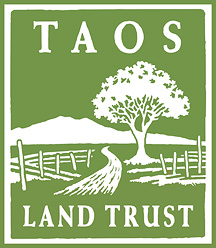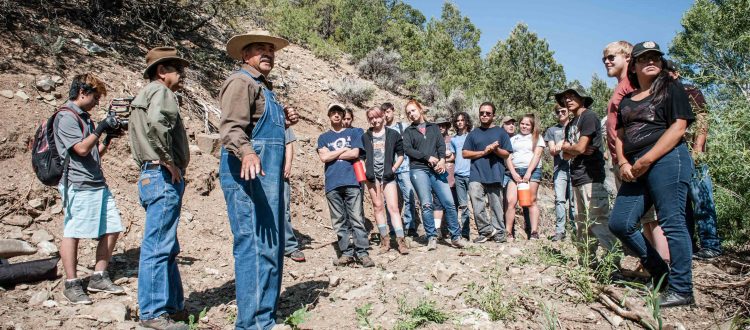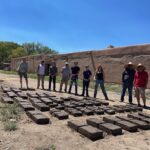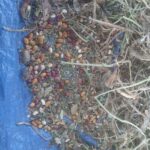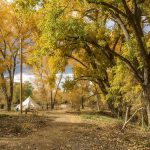Youth Conservation Corps to Return to Taos Land Trust in 2019!!
Youth Conservation Corps and the Taos Land Trust in 2018
From June 1st through August 17th, 2018, the Taos Land Trust employed 18 young New Mexicans through the New Mexico Youth Conservation Corps (YCC) to work the land at Rio Fernando Park and out in the greater Taos community.
Besides accomplishing specific physical tasks, their summer experience granted them opportunities to expand their broader life skills and learn the greater value this work contributes to the Taos community.
The primary work projects through the summer focused on cleaning and grading the overgrown and sometime buried Vigil y Romo acequia in preparation for irrigation water on the Rio Fernando Park landscape. The crews worked the main acequia, its associated laterals, and the return channel to the Rio Grande for half a mile with rakes, shovels, and loppers from Salazar Road nearly to Cornelio Road in the center of our town.
The second most engaging mode of work involved the removal of several acres of weedy species in preparation for both wetlands restoration and agricultural field restoration. Other tasks accomplished during 2018 included the GIS mapping of invasive vegetation throughout the property, the research and construction of composting bins, the research and construction of permaculture derived Hugelkultur planting beds and olla plantings, the first stages of a simple drip irrigation system, and the initial layout and construction of the trail system for the park.

Interspersed within the working week were multiple occasions for on the ground skill building workshops and an array of educational workshops. Over the summer these included:
• Team Building with Liana Sonne and FIT Taos
• First aid and CPR training
• Extensive tour of the Rio Fernando watershed and its interwoven acequia system from the La Jara wetlands all the way to the confluence with the Rio Pueblo led by multiple experts from Amigos Bravos, USFS, TVAA, and Town of Taos
• Tour of the Town of Taos Wastewater Treatment Plant
• Weed management workshop with Taos County Extension Agent – Tony Valdez
• Land ethics talks led by Maya Anthony of Taos Land Trust
• Life skills talks led by Kristina Ortez and Michelle Heinrich of Taos Land Trust
• Water quality sampling with Shannon Romeling and Amigos Bravos
• Informational visit and tour with Gordon Tooley at his Truchas tree farm
• Educational work experience with Mike Adler at Pot Creek archaeological site
• Working visit and talk with Senator Martin Heinrich
• Assistance on historical restoration project at the Duran Molina with Corky Hawk
• Permaculture farm visit with Mike Musialowski
• Tree surveying and mapping at Baca Park with Paul Bryan Jones
• “Eat the Weeds” collection, cooking, and meal with Dryland Wilds
• Visit to Compost Santo and the NMSU Alcalde Agricultural Research Center
• Tour of the restoration and landscape conservation work at Valle Vidal with Jim O’Donnell and multiple experts representing Quivira Coalition, NMGF, and USFS
• Restoration tour and work experience at Ghost Ranch with Steve Vrooman and Keystone Restoration
• Season ending swim in Abiquiu Lake.

PLEASE SUPPORT OUR COMMUNITY WORK – DONATE NOW!
The 16 to 25 year old work crew was largely from the Taos area, although some hailed from farther afield. They took to the work admirably while also leaving time for learning experiences, socializing and making friends. Although the crews were initially and arbitrarily split into 2 groups, each with their own team leader, it became apparent that alternate groupings were arising out of the natural attractions of interests and personalities. There were those that preferred the hard physical labor, even in the hot sun, while others preferred projects that required technical savvy, or perhaps some research components. Adventurous cooking skills and a good sense of humor were highly sought during the summer projects. And then there were those individuals that seemed to float between the camps, expressing interest in the broad array of work types. Regardless, the work was there for them, and they accomplished the projects handed to them with overall enthusiasm, and consistently applied work ethics.
YCC to Return in 2019!!
Fortunately for the Taos Land Trust and Rio Fernando Park, the YCC grant application has now been accepted for the 2019 working season! We will be seeking a group of 14 New Mexican youth for this summer season to take on the next stages of transforming the promising but neglected homestead into a public agricultural and nature park for the Taos community.
Those that participated for the 2018 YCC season are welcome to apply for the continuation of interesting and valuable work on the Rio Fernando park land and surrounding region. Projects for this tour of duty will include: further acequia work both on the land and around the Town of Taos, further weed mitigation projects including the possible management of a small herd of goats, replanting native tree, shrub, and forb species in the newly restored wetlands areas, agricultural bed and row construction, flood and drip irrigation earthworks and piping, the continuation of trail building projects, and the planting of seed in the agricultural fields and seedlings in the newly constructed beds.

Projects in the community will likely include: further excavation at the Pot Creek archaeological site, continuing acequia work in conjunction with TVAA projects and the Town of Taos, agricultural projects for local non-profits, small scale weed mitigation projects in support of the newly formed Taos Weed Action Group, and the participation in ecological restoration projects within the Rio Fernando watershed. Similar to 2018, a diverse and stimulating educational program will be woven within the working projects in order to give reason, purpose, and curiosity balance with the physical work.
The YCC program with the Taos Land Trust at Rio Fernando Park grants pay for working opportunities for local youth while fulfilling a broad array of land and watershed restoration goals. Taos Land Trust hopes to continue this mutually beneficial relationship with local youth to encourage the growth of community participation and burgeoning community stewardship. The opportunities for these connections and explorations are virtually limitless as one land care project leads to another, growing skills and excitement within the best of all possible social interactions with natural and agricultural landscapes.
